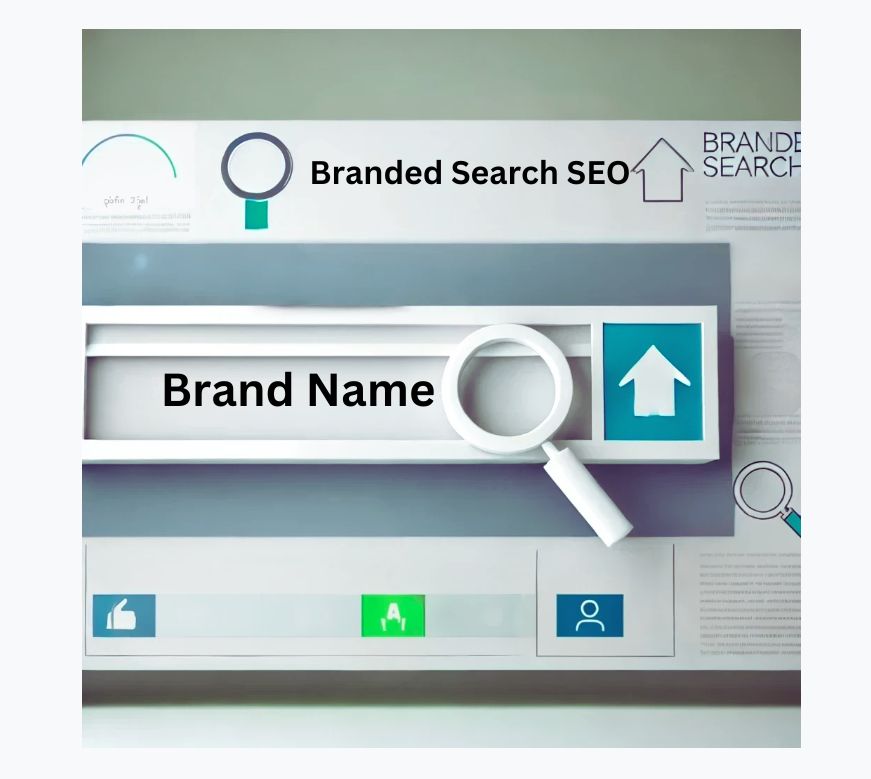Have you recently searched online for your business?
I assume you have, but that doesn’t guarantee having a thorough strategy for optimizing your branded search.
Well, every business wants its brand to stand out. When people search for your brand, you want your site to appear on top of the SERP(Search Engine Results Page). Particularly if you are a local business, you want to ensure that your name takes prominence over your competitors.
Branded searches have evolved recently, so going by the old rules won’t necessarily help you as it might have even just a couple of years ago.
However, branded search optimization involves more than just getting your website URLs to show up for your brand name. It’s an ongoing effort that can result in higher conversions and more consistent customer experiences.
If you’ve found yourself on this page, it means you’re looking to improve your business website for branded search.
Well, let’s start from the beginning.
What is Branded Search?
A branded search (also known as brand-driven search) is a search that people conduct when looking for particular brands, rather than general item descriptions. Branded keyword phrases are keywords that contain brand names.
For example, if you’re looking for high-end sporting goods, a branded search would consist of words like “Nike sneakers,” “REI tents,” and “Columbia jackets.” A non-branded search would simply say “jackets,” “rain jackets,” etc.

Why Should Branded Search be Your SEO Priority?
Your company’s brand is its most important component. You work hard to build your brand, with its particular characteristics, and you want to be recognized accordingly.
When customers search for a specific brand, search engines tend to see that company as more reliable and trustworthy.
Additionally, branded keywords typically suggest a strong intention to make a purchase. People who use these terms are already familiar with your brand and are more likely to buy from you. Therefore, it is crucial to not only take advantage of the current search volume for your brand but also to increase it.
Simply put, it is great to be known as “the best ice cream shop in town,” but it’s even better – and more effective – to be known as Baskin Robbins, as this is a name that resonates with people far and wide. Even if you are a local business, you can build your brand among your community to the point where locals all know your name and identify it as being the best in the business.
Furthermore, optimizing for branded searches can bring you higher conversion rates as a result of people’s desire to stick to well-known brands.
Overall, there could be plenty of companies that fit non-branded keyword descriptions. Your brand name is the key to pinpointing your company in particular. Therefore, optimizing your page according to your brand will bring you far more traffic than simply optimizing by description.
How to Start Improving Your Brand’s Search Visibility?
Achieving high rankings for brand searches can be challenging. It is often more attainable for established brands with a strong presence, such as Coca-Cola, McDonald’s, Starbucks, and others. These globally recognized companies naturally appear at the top of search results due to their widespread popularity.
On the other hand, smaller businesses must put in effort to increase their brand visibility and surpass their competitors in search rankings.
There are a range of reasons that may lead to poor rankings for new brands. Among the most common reasons are:
- Competition with another brand with a similar brand name.
- Not indexed website.
- Not properly SEO-optimized website.
- Not having a clear brand name or having multiple brand names.
- Poor activity on social media platforms.
If you are aiming to avoid the mentioned issues and make your brand more noticeable in global rankings, the initial step is to manage brand monitoring to assess your brand’s current position and identify areas for enhancement.
Engaging a reputable SEO agency can assist in achieving this goal, while also enhancing your brand’s search rankings and surpassing competitors.

7 Ways to Increase Your Branded Search Traffic
Let’s now take a look at some concrete things that you can do to increase your branded search traffic.
By following these steps carefully, you’ll see a rapid shift in your branded traffic levels.
1. Do Branded Keyword Research
Before you make any changes to your site, you’ll want to first do research on branded keywords to figure out which ones are both most relevant to your site, and of course which help your page ranking the most.
An obvious starting point for researching branded keywords is looking up your brand name itself. But there may be many more associated keywords you’re not necessarily aware of that will also help your branding optimization.
A good way to figure out what your branded keywords are is to use the Google Keyword Planner. Once you’ve figured out what they are, you’ll be in a good position to start using them on your site.
It also pays to look at your competitors, in addition to your site. For branded keywords, this means making a comparison between your keywords and those of your competitors and assessing the differences in how they are used. Once you’ve figured out what these differences are, you should then cross-check the results for their respective effectiveness.
2. Raise Brand Awareness with Digital Display Ads
Digital display ads can be an effective way to raise your brand awareness. These types of ads take different forms, including banners, images, videos, “rich media”, etc. Think about what type of ad best suits your purposes. If you are selling sports equipment, perhaps a moving action shot would best suit your purposes. If you are selling suits, a still image might be more appropriate.
Using display ads requires the use of a display ad network. There are quite a few ad networks that you can choose from, depending on where you want to place your ads. These include things like Google Ads and Yahoo!, but also Facebook and other more particular platforms. There are also ad networks that are mobile-only.
Again, what you choose depends on your company’s message and the audience that you want to target.
3. Establish Your Brand’s Name and Voice
Just as important as your brand’s name itself is its “voice.” What this refers to is the tone that you use to reach your target audience. If you are selling children’s toys, for example, it’s probably best to use a fun, simple voice, rather than a literary one.
You want to use a voice that will be just as unique as your product or service and will stick in the minds of people. Guinness created the pelican series in the 1930s and developed into a series of ads so successful that now people globally recognize the pelican immediately upon seeing it.
In establishing a voice for your company you’ll want to take into consideration several things:
- The foundational ideas upon which your business was built
- The types of voice that generally resonates with your target audience
- What may or may not be working for your competitors
4. Land Guest Blogging Opportunities
One way to get your name out on additional platforms is to blog on other people’s sites. This doesn’t necessarily mean the sites of your direct competitors, but you can find sites that have products or services that are complementary to yours, including those related to search branding where your opinion might be considered valuable by site viewers. For example, if you’re selling nutritional products, perhaps a wellness site would appreciate your contribution to something related to nutrition and good health.
Guest blogging can be beneficial for several reasons: It gives you additional brand awareness with the other site’s audience; you’ll have the opportunity to add your site link to the blog, and of course, the people who read your post will potentially lead others to your site, as well.
There are several ways that you can go about this.
- You can simply reach out to sites that you think would be useful for you and see if they’re willing to accept guest posts.
- You can also use Google search operators, which allows for customized searches to uncover lists of available sites.
- You can do an “inURL search” for specific words, such as “write for us,” which will provide you with search results of sites that have specific pages devoted to guest writing.
When you find sites that accept guest bloggers, you’ll of course want to cross-check them with third-party reviewers and make sure that they themselves are reputable sites. If they’re not, people will wonder why you bothered with them in the first place.
5. Manage Your Online Reputation
Beyond simply managing your page itself, it is a good idea to monitor all of the areas where your brand might appear and ensure that your reputation is in good shape everywhere that it appears online.
Negative reviews or slander can sometimes do irreparable damage to a company’s reputation. One recent study concluded that 86% of customers hesitate to use any company that has received negative reviews.
How can you go about managing your online reputation? There are several concrete steps that you can take to minimize (if not eliminate) negative content about you online:
- Find out where negative commentary might be. Negative comments can exist on many different forums, including review sites, news sites, discussion forums, etc. Make a conscientious effort to find whatever material about you exists online. Wherever possible, contact the owners of the sites in question. If commentary is particularly negative, you can offer to either provide qualifying commentary or compensate the site owners for removing it.
In some cases, you might be able to take legal action if you think that you’ve been unjustifiably slandered. You’ll need to consult a lawyer to figure this out first, though.
- Try to override the negative commentary with positive commentary. If you provide positive commentary on a sufficient number of other sites, you can potentially push the negative commentary off of the first page of a SERP. This will significantly reduce the possibility that people will see it.
6. Encourage Customer Reviews
Encouraging your customers to leave positive comments on review sites can help significantly in building your brand reputation. You can even include a Call to Action (CTA) on your site to draw attention to this.
Customer reviews are more important than many people realize. While some might think that review boards are simply a forum for the terminally disgruntled, statistics indicate otherwise. One study concluded that 90% of customers read reviews before visiting a business. And even if your site appears at the top of a SERP, a bad review can deter potential site viewers from clicking on it.
Therefore, encouraging customer reviews could boost your business. You can even offer incentives in the form of discounts, loyalty points, or free items for doing so.
7. Optimize Your Site for Search
Last but not least, you want to optimize your page using your branded keywords to drive branded traffic. You can take the following steps:
Use Your Brand Keywords As Much As Possible
It may sound obvious, but the repeated use of your brand name is one of the best ways to have it appear in the SERPs. You should ensure that this includes all of the parts of your site that the search engines look for:
- Page content (including photo and video captions and alt text)
- Meta descriptions
- URL descriptions
While you don’t want to “stuff” your page unnecessarily with too many uses of any particular word – including your brand name – a reasonable amount of repetition throughout the pages of your site will be beneficial for your SERP results.

Create Separate Pages For Different Keywords
Companies that can boast more than one popular brand often create dedicated pages for each of their brands. For example, Nike has made several of its shoe types famous globally. If you look at Nike’s website, you’ll see separate pages for “Nike Free,” “Air Max,” “Air Jordan,” etc.
Even if you aren’t as big as Nike, it pays to devote attention to each of your brand’s associated keywords by mentioning them on distinct pages. This includes mentions in text, URLs, titles, etc. If you do this, not only will your site be easier to navigate, but these distinct results will appear on SERPs when people do searches for them. This will eliminate the need for people to go through your site to get to particular pages.
Optimize Meta Descriptions
Your meta description is the first thing that appears on any given SERP. You should take the time to optimize it according to your brand keywords as this plays just as big of a role in generating site-branded traffic as your on-page content does.
Note also that meta descriptions can vary according to device type. What appears on a PC might not be the same as what appears on an Android. Be sure to check your results thoroughly across devices to make sure that all potential viewers are seeing what you want them to see.
Optimize For Map Packs
Particularly if you’re running a local business, you want yours to be the company that people go to when they look for particular items. And you want your brand to stand out as being the one to choose in whatever regions where you have a presence.
Therefore, you should optimize for “map packs.” You can do this by first ensuring that your company information is accurate and consistent across map searches. To really be effective, you should make sure that all of your social media include this information, as well (people find businesses through Instagram too, after all). In using local SEO services, you must be comprehensive in your listings.
Once you’ve ensured that all of your geographical information is accurate and consistent across platforms, you should use structured data markup to more effectively target the search engines. Structured data markup is a representation of your data in such a way that search engines can easily read and interpret it.
Skyrocket Your Brand to the Top of Search with Andava Digitals
Optimizing your business website for branded search is a must in the modern highly compatible digital world. It will help your business go strong and thrive in the market.
However, tackling this task alone can be challenging.
But do not worry, Andava Digital is here to assist you whenever you need it. Our team of experienced SEO specialists will conduct a thorough audit of your website and craft a strategy to ensure your brand appears in the right place at the right time.
With our expertise, we’ll ensure your website ranks high for branded keywords, driving more targeted traffic and conversions. Don’t miss out on this opportunity to make your brand stand out in search results.
Contact us today to get started!